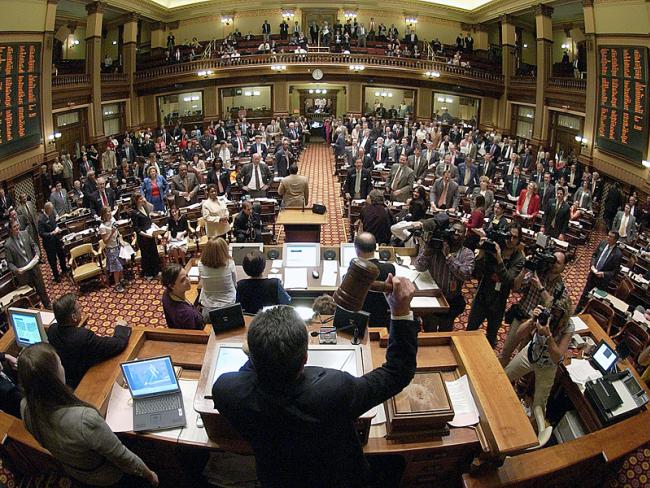By: Ryan Prior
In Washington, D.C. this weekend the American Conservative Union is hosting its annual Conservative Political Action Conference (CPAC), a major gathering of thousands of conservative activists that serves as barometer for the pulse of the conservative movement in the year to come. With parades of supporters of each presidential candidate engaging in spirited shouting matches in the hotel lobby (“MITT! MITT! MITT!”), this year’s event is a preview of what a brokered convention might look like in late summer.
You can easily find coverage of Santorum’s, Romney’s, and Gingrich’s speeches in the mainstream media. I’ll focus instead on the more immediate personal details you can’t get anywhere else.
Conversation with Cain’s Tax Guru
At CPAC Thursday afternoon, I had a good conversation with Rich Lowrie, the architect of Herman Cain’s 9-9-9 tax plan. Regardless of what one thinks of the plan, and certainly there are major concerns, you have to admire his courage in working with Cain to produce the simplest, most distinctive, and most original tax reform plan of the 2012 campaign.
He told me that ten years ago, he began to think more about how to make a difference for society more generally.
“When you volunteer your time, the demands on your time skyrocket,” he said. Soon he was spending one day a week out of the office, but he realized that there was no value added in him ladling out soup at a charity kitchen. Any other human body could do the same thing.
He realized he could add true value by sticking to his natural skill set: economics and tax policy. He met Cain seven years ago, when the former presidential candidate was a Georgia talk radio host. The two began having political discussions. “You labor in obscurity for years and years,” Lowrie told me, “And then something like this happens,” referring to his prominent role in the Cain campaign.
He’s on the road now with Cain Solutions working on “issue education.” As America struggles toward an eventual broad tax reform strategy, it’s worth remembering this simple story of a man whose years of quiet work became a significant piece of the national debate.
Tories at CPAC
Though CPAC has been strangely bereft of the strong Ron Paul presence it had last year, another retrograde political figure had sent an equally flamboyant activist: this time we had a supporter of King George III dressed breeches, a three-cornered hat and a red coat.
He was advocating his 3-3-3 tax plan, even simpler than Herman Cain’s plan 9-9-9 plan: 3% on tea, 3% on stamps, and 3% on rum.
“Look what George Washington started!” the British loyalist argued. “16 trillion in national debt? The King would have never done that!”
Social Conservatives at CPAC?
I spent the majority of the Friday looking for signs that the 2012 CPAC is more socially conservative than in previous years, particularly given the rise of Rick Santorum. There weren’t many.
Though five strong-willed and passionate women led a pro-life panel early in the day, there wasn’t much other evidence of a rise of social conservatism. I searched all over the trade floor and found only the booth for the Susan B. Anthony List, a feminist pro-life group, and the booth for the Family Research Council. Bright-eyed, articulate representatives were eager to support their cause, but never gave me the impression that their views were on the ascendancy. “Well maybe we’re more influential. Yeah, with Rick Santorum and all?” one guessed. Kristan Hawkins, a pro-life activist influential in the charge to remove abortion funding from the Affordable Care Act, was taken aback at the suggestion the conference was more socially conservative. “Really!? Have you seen that?”
A Georgia student, standing in line to meet Santorum, told me, “I don’t think it’s socially conservative at all. Santorum’s speech focused more on economic issues.” As if to underscore the point, he and his friends at that moment exited the line, deciding that eating lunch was more appealing than meeting a possible future social conservative president.
As I was leaving the hotel that night, the road was clogged by about a hundred Occupy protestors trying to fight their way into the convention.
“Racist, sexist, anti-gay…CPAC bigots go away!” they chanted over and over, and even in my face, as my suit and tie made me look like the enemy.
The Occupiers have a point. The Republican Party needs to change the conversation on these topics: Gingrich remains unaware of the racial implications of opening his CPAC speech calling Obama the “food stamp” president, Santorum today opposed the Pentagon’s plan to move women closer to combat roles, and Romney defended the Defense of Marriage Act from the podium.
These were the trickles of cultural conservatism from the main hall. If anything, the movement within the GOP to mute its controversial social views will undercut the Occupiers’ criticisms. It might not quite be at the level of Governor Mitch Daniels’ proposed “truce on social issues,” but downplaying exclusive views is important.
Yet if I did actually hear one thing today at CPAC, it was unabashed support for the First Amendment freedoms to speak freely, petition the government, and to assemble peacefully.
The principle Republicans hold most sacred is the inalienable, God-given right of the Occupiers to criticize them outside of their yearly fortress at the Marriott Wardman Park.

